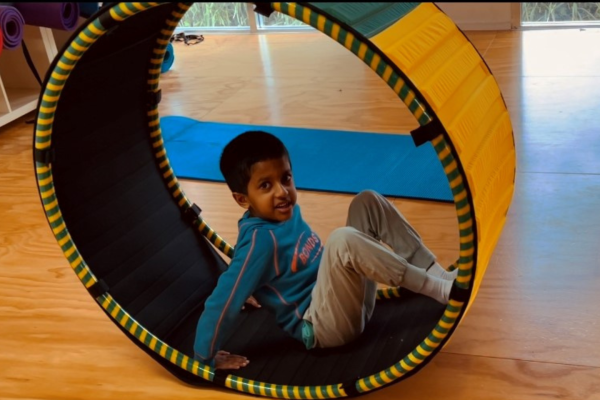
The rollercoaster ride of coming to terms with your child’s diagnosis
You enter the doctor’s room, clammy hands and feeling nervous – knowing that something is wrong but you just can’t quite put your finger on it.
Comments from friends, family and possibly teachers over the months, even years have been in the back of your mind. Deep down there is a fire in your belly and you just know there has to be an explanation for why things haven’t been adding up. Perhaps missed milestones or even a ‘delay’ but the ‘delay’ has been ongoing.
You hear the words from the doctor, but you are numb. You nod your head and your face is calm but inside your head, your mind is racing. One word screams through in your mind – ‘Noooooooooooo!’
The doctor has just told you what you suspected all along. There is an underlying condition that now impacts your child’s future. Your child’s future is no longer what you had imagined – it is no longer looking like an ‘ordinary life’.
You leave the doctor’s office and head home.
You go through the motions until the house is still and it’s just you and your computer. You now have time to gather your thoughts – you start tapping at the keyboard – searching for anything. You search and search. But you don’t really know what you are searching for. A further clinical explanation of your child’s diagnosis? Maybe a support group…there must be other people out there? But then you remember, this is all new to you. What do you even type in the search bar?
You’ve heard people talk about getting ‘help’ but you didn’t really take it in – it wasn’t happening to you, it was happening to someone else.
You collapse into bed exhausted, only to be woken a few hours later by the very one person that needs your help.
Where do any of us go, in those early days, months, even years? We have the tools at our fingertips due to technology but how do we use them, if we don’t know what we need to use them for!
Lack of information
Despite what we may have previously thought, there is not always a lot of information in that initial consult with your child’s doctor. You are grasping at the facts that have been presented to you, and you are scrambling to make sense of it all.
As parents, in that initial consult we need practical recommendations for ongoing assistance and support avenues. A lot of the time, we do not receive this or it’s just not comprehensive enough. If you’re lucky, you may get a list of a few names and numbers to call; and if you’re really lucky – you may even receive a pamphlet!
Take it slow
I made the mistake of wanting to do everything, all at once! It was my ‘damage control’ mode kicking in! In hindsight, all it did was wear me out and put a strain on my own mental health as well as my family around me.
As a parent, we want to do everything for our child, even more so when our child is unwell or has a condition that is life altering.
Try and take things week by week, and break up your days. Do what makes you feel a bit in control, relax your mind – if only for a moment, so that your body follows suit.
Not everyone wants to get social right away
It is perfectly fine that you want to protect your heart and that of your child’s – it is natural to go into that space where you just want to sit with your thoughts and not talk a great deal about it. Fielding questions that you just don’t know the answers to at this stage, to many people, is extremely taxing! In fact, just as a side note, six years down the line and I still field questions I can’t answer – but I am now much better at my responses! Just be careful not to remain by yourself in that headspace of ‘protection’ for too long – sometimes you can slip into a hole of isolation, without noticing it’s even happening.
Just remember – YOU ARE NOT ALONE
Even if you are feeling alone right now; if you have managed to slip into that ‘hole of isolation’ I mentioned above, you may even feel some comfort in being alone – it’s ‘safe’. The thought of rising, fighting each and every day for your child’s right to their future against the odds; the physical and emotional demands that now lay ahead of you, can feel simply terrifying.
Remember, there are women who have walked before you along a similar path; reach out to them. Find them! Facebook groups are a wonderful resource to reach out and connect with others who can help you navigate your new world. Or if it’s just someone who ‘understands’ – you can find them.
Take one day at a time
You are no doubt feeling disconnected from the people around as you feel they don’t know what to say, or it could be the other end of the spectrum – they are saying everything but nothing that you feel is truly helpful! People want to help but often don’t know how. And that’s ok, because it is new to them as well. Whether it’s family or friends – they are standing on the outside watching. At this present time, you need spectators to get into the ring with you, to truly help. If you aren’t ready for this, then tell them. You are closing ranks at this time, but will open up when the time is right.
Life is never going to be ordinary again
If someone had told me 6 years ago, that life would never be the same again – it would never be ‘ordinary’, I would have laughed, thinking that of course it will be – it must settle. As time has gone by we have found our rhythm and as different hurdles present themselves, I am reminded we are not living an ordinary life.
Through the many shifts and transition periods you go through as a family, you begin to realise it is actually an EXTRAORDINARY LIFE!







